Category: Anarchism
Ruth Kinna on Anarchism
Commentary:
After I perused Ruth Kinna’s Anarchism: A Beginner’s Guide (2005), it struck me that it was not for beginners, but a compendium for scholars of anarchism. For beginners, it should be short and to the point, and not be cluttered with names and classifications.
Given that there is an ordinary common usage for the words “anarchy,” “anarchist,” and “anarchism,” as meaning something chaotic and disorderly, there is a need to stipulate how one wishes to use these words in a laudatory rather than in a disparaging way.
There is also the problem that though anyone may call himself an “anarchist,” — or anything else he wishes — he may not be an “anarchist” in the stipulated sense.
There is also the problem caused by associating a description of a person, on the one hand, and the person’s actions, on the other, where the description has no relevance to the action. I have in mind, for example, Jordan Peterson calling Stalin a Marxist, and then blaming Stalin’s mass murders on Marxism. There would be some rationale for this if the doctrine of Marxism indeed called for mass murder. But it does not. Think of it this way. Assume that Marxism stipulates some end state, and is silent about the means. Then means are optional, rather than stipulated by Marxism. So, at best, we could say that Stalin used mass murder for Marxist ends.
In like manner, there were people who identified themselves as anarchists, and assassinated politicians. Here we have to distinguish again the state of affairs which one is aiming at (the ends), and the means which will bring this state about.
I call myself an anarcho-socialist for the following reason. I agree with Anton Menger that socialism ultimately aims at subsistence through the right to the full produce of one’s labor, which (in my view) can be obtained by having free access to land. On the other hand, I believe that what prevents this state of affairs from occurring is the State. Thus, for me, getting rid of the State is the essence of anarchism. And it seems to me to be a truncated reason for getting rid of the State simply because one does not like to take orders and be bossed around (as a slave, a serf, or a wage-laborer). No, I want to get rid of the State because in addition to bossing me around, it makes the obtaining of subsistence either more difficult than otherwise, or it blocks me from getting subsistence altogether.
My models for such an anarcho-socialistic existence are stateless, indigenous societies of people, who are called “primitive,” “savages,” and “barbarians.” And they are models, as are all models, in certain respects only. And they are models in two respects: they have a (1) free access to subsistence land, and are organized as (2) small democratic tribes.
Any other characteristics about such tribes are irrelevant; specifically, what is irrelevant are their beliefs, their economies, and their mores.
Ruth Kinna has a chapter about strategies to achieve an anarchist society. This is a separate problem and does not define anarchism. Some so-called anarchists believed that assassination of politicians is the way to go, others have believed in a general (universal) strike by workers. Others, like Nestor Makhno, used guerrilla warfare to defend themselves from aggressors. But the means for getting or defending an anarchist society are separate issues from the question of what constitutes an anarchist society.
Anarchism among Kurds and Ukrainians
In the United States, we take linguistic nationalism for granted — everyone speaks English. Those that do not are almost invisible. And assimilating people into the English language is an almost gentle “melting pot.”
Not so in other parts of the world which practice a deliberate, forced linguistic assimilation to the dominant State language.
The plight between the current Kurds and pre-World War I Ukrainians is very similar. Not to go too far in history, the land of Ukrainians — i.e., those who speak the Ukrainian language — was in the 18th century divided between Russia and the Polish-Lithuanian Commonwealth as this map shows.

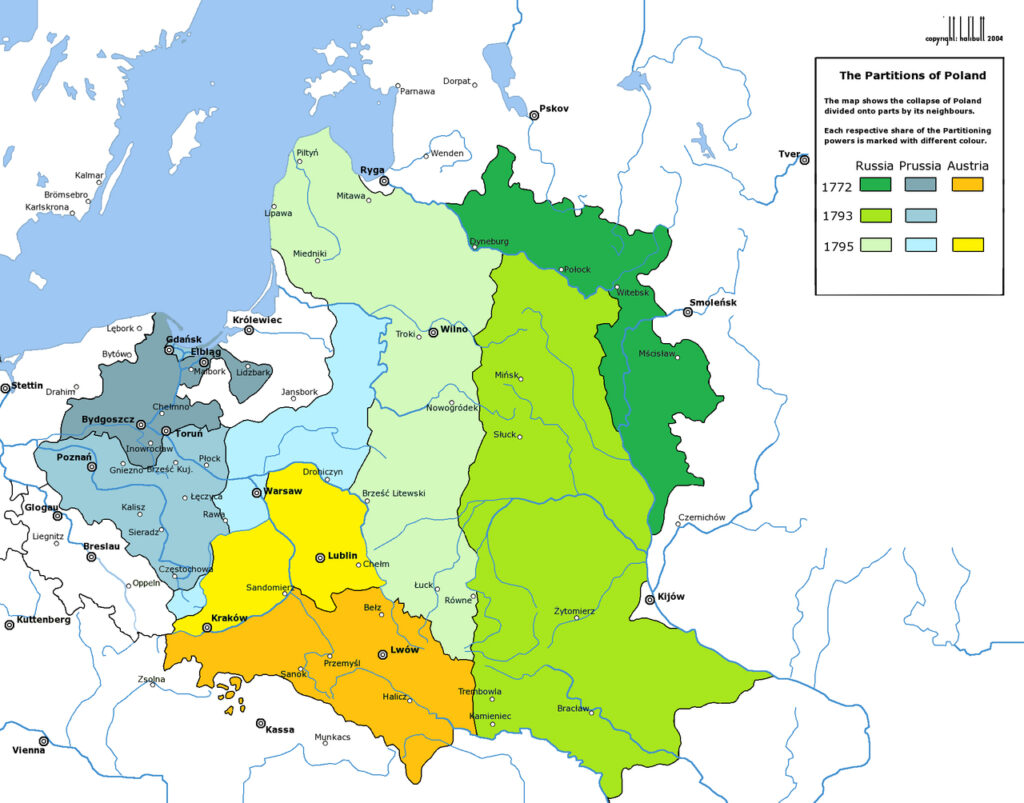
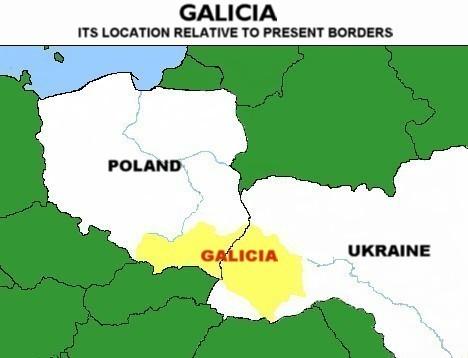
Similarly, the Kurds today find themselves living in four different States: Turkey, Iran, Iraq, and Syria (an area known as Kurdistan). And they are experiencing Turkification, Arabization, and Persianization.
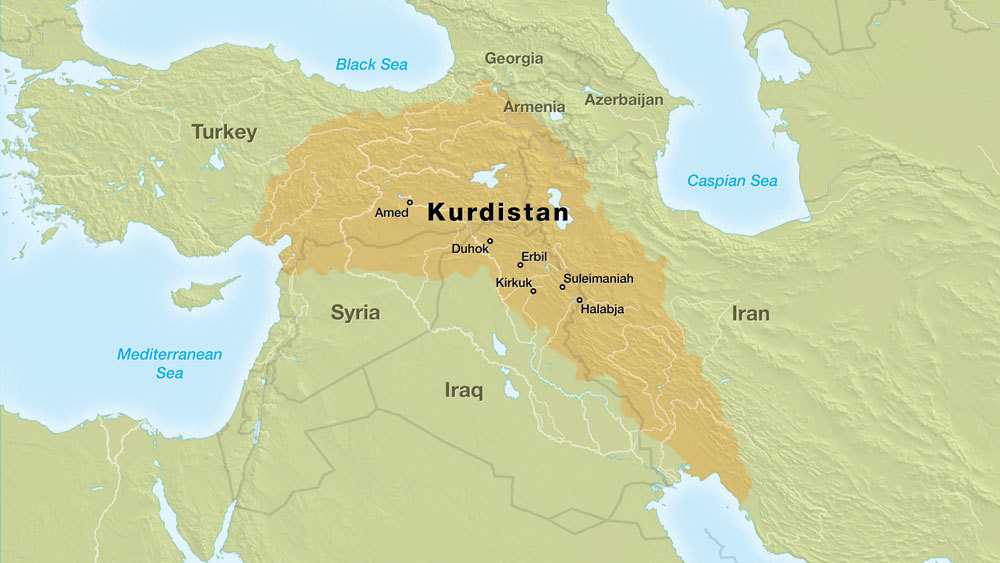
In Ukraine, in the 1880s, Mykhailo Drahomanov, seeing no prospect for a Ukrainian State, and not desiring a centralized State, advocated an anarchist structure of federated communities, just as Ocalan is advocating today for the Kurds — and is succeeding in Rojava.
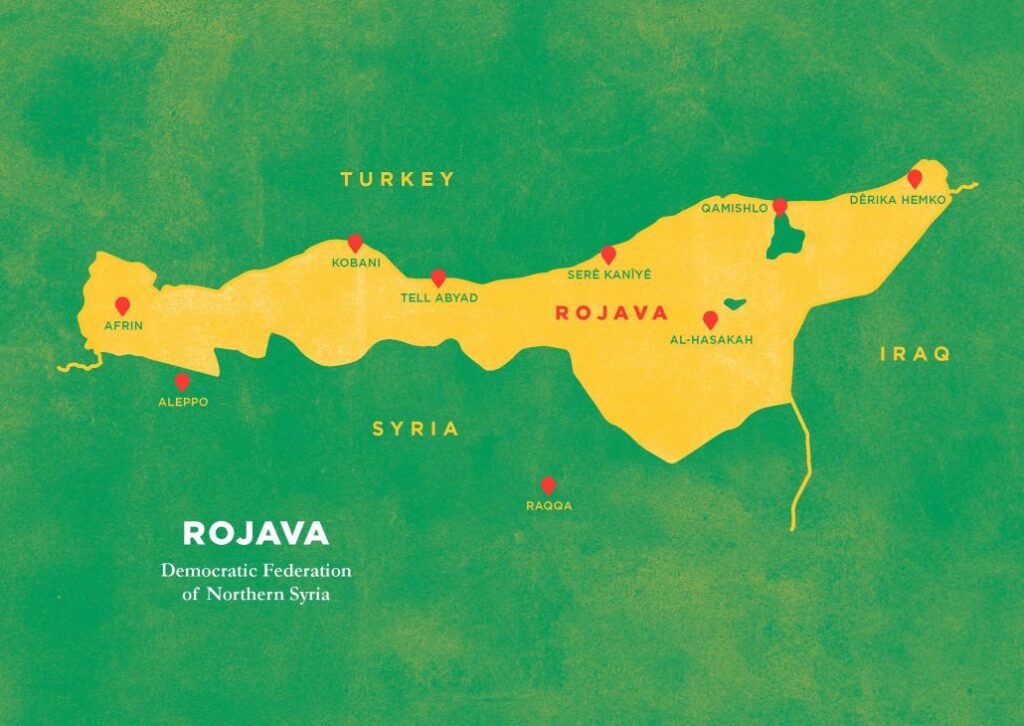
There is a difference between what I will call “State federalism” and a “federalism between communities.” What we have in the United States is a federation of States, and States themselves are federations of municipalities (which themselves have the structure of States). By a “State” I mean a centralized government with or without macro-democracy.
The leading Ukrainian intellectuals (including the Brotherhood of Saints Cyril and Methodius) — and still into the period of the Russian revolution — which included the position of the first President of Ukraine, Hrushevsky — all favored “State federalism.” However, in view of the irreconcilability with the Bolshevik regime of the power structure, and the subsequent Russian invasion, the Central Council of Ukraine proclaimed Ukrainian independence as a sovereign State.
In the period of 1917-1921, Ukraine became a battleground between four forces: Ukrainian State nationalists, Russian and Ukrainian Bolsheviks, the reactionary White monarchists and republicans, and the Ukrainian anarchists, who wanted everyone of these centralizing invaders out of their territories. The most successful of these was Nestor Makhno, who although an anarchist and a follower of Peter Kropotkin, was not familiar with the writings of Drahomanov — though in fact he was in resonance with his thoughts. He managed to control a large region of southeastern Ukraine (see the map below).
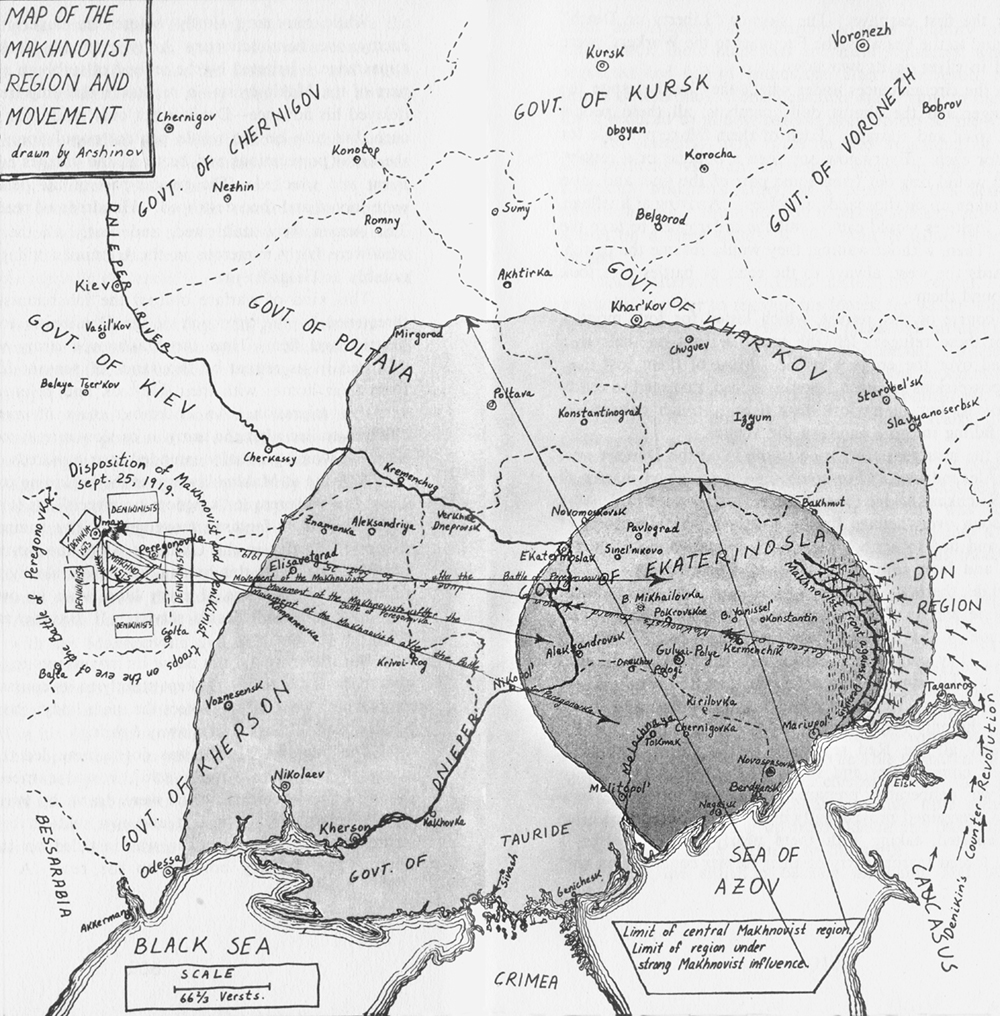
After the First World War, Ukraine became a federated State within the Soviet Union suffering a genocide [Holodomor] under Stalin, and a policy of further Russification.
And after the downfall of the Soviet Union (1991), Ukraine remains a very centralized State with a sizable Russian-speaking population, some of whom have an evident desire to embrace mother Russia, a situation which made possible the Russian annexation of Crimea, and the present stalemate in the Donbass.
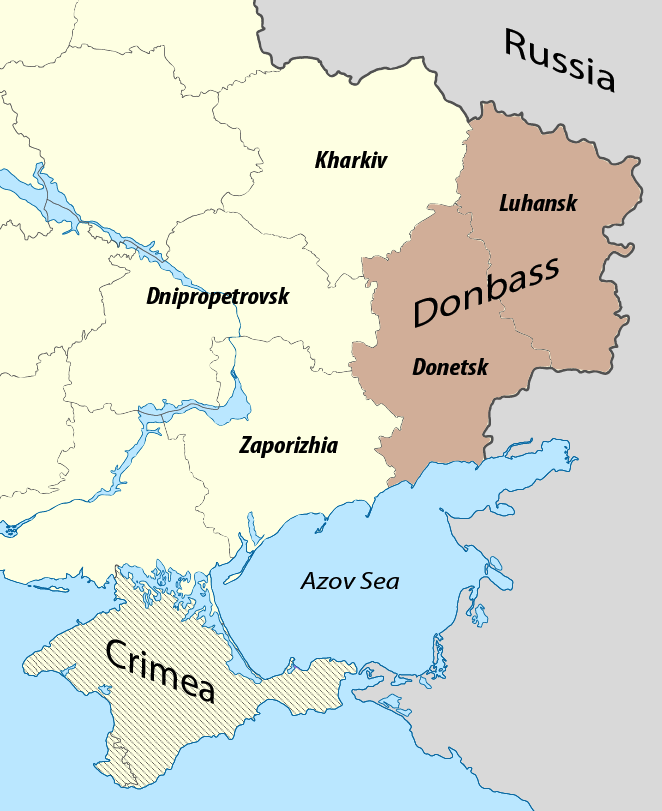
Carne William Ross explains why he became an anarchist.
Roads to Anarchism
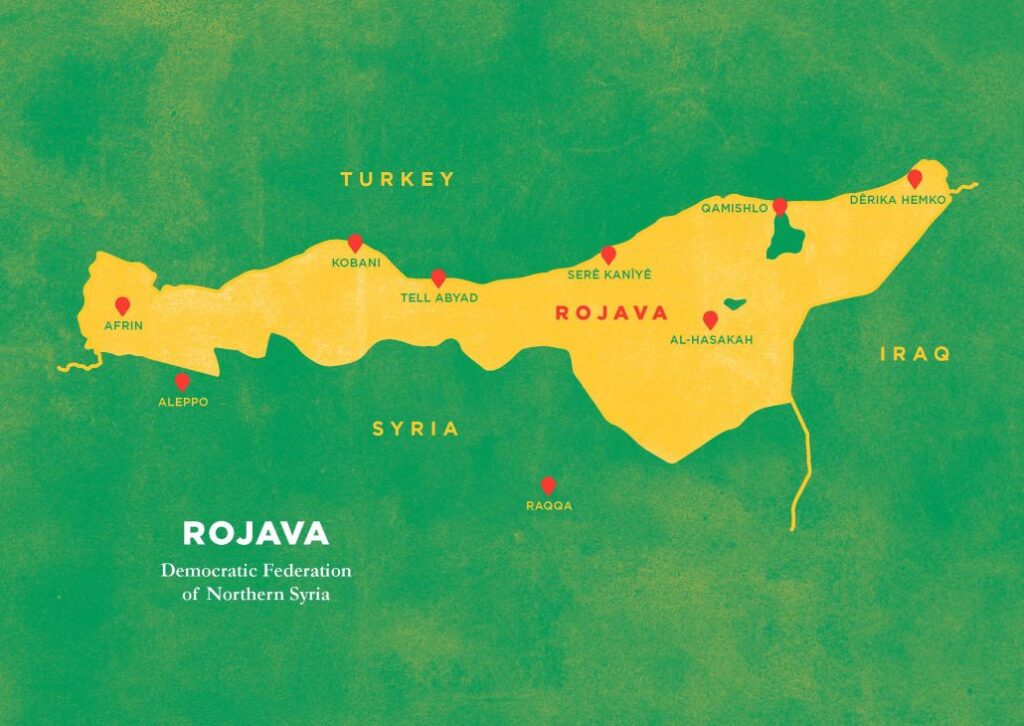
The common feature of all of them is that what transpired in these places was during civil wars. This means that the normal police powers of a State were either suspended or inoperative, and this created a period of time in which some other forms of organization could be tried. And if these experiments were to be experiments in anarchism, two things had to come into play — especially with peasants: redistribution of the land in some fair manner, and giving political power to a local community, such as, for example, a village. A third element operating in some of these circumstances, which may have acted as a catalyst, was a leader.
Let me consider each of these experiments in turn.
The Mexican Revolution. The beginning of the Mexican Revolution is taken to be November 20, 1910. It was started by Francisco Madero with his Plan of San Luis Potosi, which aimed to overthrown the then President of Mexico, Porfirio Diaz — which it did. [I am hesitant to call a coup — however orchestrated — a revolution. It is more like a non-democratic replacement of one “dictator” by another. This is also true of all the recent so-called “color” revolutions.]
What is of interest to me as an anarchist is the activity of Emiliano Zapata whose Plan of Ayala called for the restitution of land to the peasants of Morelos. This was one step towards anarchism. The other step would have been the formation of local autonomous communities. If Zapata had anything like this in mind, he wanted it to be implemented through a central government. And so, he pinned his hopes on a visionary President. In this respect, he was not an anarchist. But what is important is that there was a leader to whom the peasants flocked for the sake of land rights.
[Since 1994, there has been an anarchist movement in Mexico, in Chiapas. It calls itself the Zapatista Army of National Liberation.
Unlike the other anarchist movements which I focus on, it is taking place during a period in which Mexico is relatively stable.]
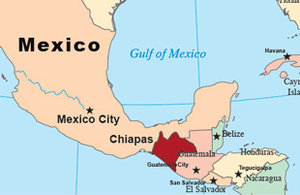
In Ukraine, during the Russian Revolution and Civil War (1917-1921), while various centralizing armies (Red, White, Nationalists) were aggresively expanding (through territorial incursions), Nestor Makhno, a self-conscious anarchist, and follower of Kropotkin, was engaged in two projects. The first was to fend off all military incursion into his territory. The second was to institute local councils for handling land distribution and self-organization. In both regards he was successful until overwhelmed by superior Bolshevik military strength.
In Spain there was a long-standing historical involvement with anarchism from the days of Bakunin. There was the CNT, a huge libertarian union, and there was the FAI, an anarchist federation. When Civil War broke out in 1936, in the anarchist areas, people collectivized farms and industry. Spain was an exception in not having one anarchist leader; instead it had an anarchist tradition. However, one anarchist fighter did stand out — Buenaventura Durruti, who was killed on Nov. 20, 1936.
The Spanish Republicans (including anarchists and communists) lost the Civil War to Franco who was aided both by Hitler and Mussolini.
We come now to the present and the plight of the Kurds. After World War I, and despite Woodrow Wilson’s rhetoric about the self-determination of nationalities [Fourteen Points], the Kurds did not get a State; instead they are scattered within four States in the region known as Kurdistan.
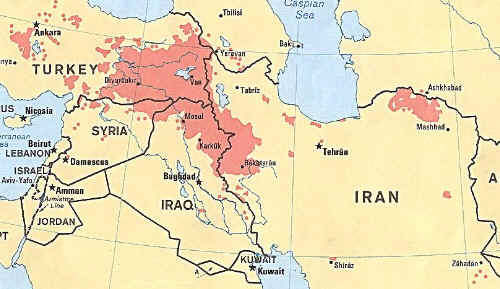
The Kurds are fortunate to have a leader, Abdullah Ocelan, who combines the features of the Ukrainian freedom and independence fighter Stepan Bandera and that of the anarchists Nestor Makhno and Mykhailo Drahomanov. Ocelan helped to found the PKK in 1978, a Marxist Kurdish worker’s party which waged guerrilla warfare against Turkey for an independent Kurdistan. This is analogous to Stepan Bandera as the head of the OUN-B fighting for Ukrainian independence. In 1999, Ocelan was abducted from Nairobi, Kenya and flow to Turkey, where he was tried, convicted, and sentence to be executed. This was commuted to life inprisonment on the island of Imrali on the Sea of Marmara.
In 2005 Ocalan issues the Declaration of Democratic Confederalism in Kurdistan. This marked a break with his Marxism and an advocacy of anarchism, a position which was adopted by the PKK. His main inspiration came from Murray Bookchin‘s “The Ecology of Freedom [1982].”
[Ocalan’s current position is very similar to that which was advocated by Mykhailo Drahomanov, under similar circumstances when the Ukrainian population was living in territories ruled by Austro-Hungary in the west, and Russia in the east.]
So far since 2012, the Kurds in Syria have created a polyethnic Autonomous Administration of North and East Syria (Rojava) — an anarchist experiment. The hope is that all of Kurdistan can be made a part of federated States.
Whether Rojava and the hope of federalism will survive is yet to be seen.
Is anarchism understood only by people who are highly self-conscious?
Yes. From a theoretical or speculative perspective, it seems that the idea of anarchism is difficult for people to grasp. First, they probably understand it in the sense of lawlessness — a sort of random rampage. So, it is the word “anarchism” which is not understood by people in a scholarly manner. Again, as to the political theory of anarchism, ordinary people are totally ignorant of it. This is also true of historical events. Inasmuch as people are ignorant of history, to that extant they are also ignorant of anarchist movements.
No. If we understand by anarchism (1) free access to subsistence land, and (2) direct democracy by a small group, then (1) an anarchistic society is the most natural and normal society of people. All indigenous people — I am thinking of hunter/gatherers primarily — untouched by States are anarchists. This is the anthropological finding. (2) Under conditions of civil war as occurred in Mexico, Ukraine, Spain, and now in Syria [Rojava], people — especially peasants — become anarchists. They divide the land equally and gather together to make decisions through direct democracy.
Three attempts at an anarchist society
Other than indigenous or primitive anarchism, there were only two temporarily successful anarchist experiments.
The first one was in Ukraine, during the Russian and Ukrainian Civil War (1917-1921). The military leader of this anarchist movement was Nestor Makhno who managed to control the southeaster area of Ukraine. The program consisted of distributing land to those who worked it, and instituting local councils which operated by direct democracy. [a caveat: anarchism is not against government; it is against a hierarchical top-down democracy — if it is a democracy — elected through mass or macro-voting]. The Makhnovchina — as the territory was know — eventually was conquered by Bolsheviks due to a lack of weapons.
The second attempt at an anarchist society occurred in Spain — particularly in Catalonia (see George Orwell’s “Homage to Catalonia”) — between 1936 and 1939. The experiment failed because the Spanish Republic lost to the coup of Franko, aided by the arms of Hitler and Mussolini (a destruction so well depicted by Picasso’s “Guernica”)
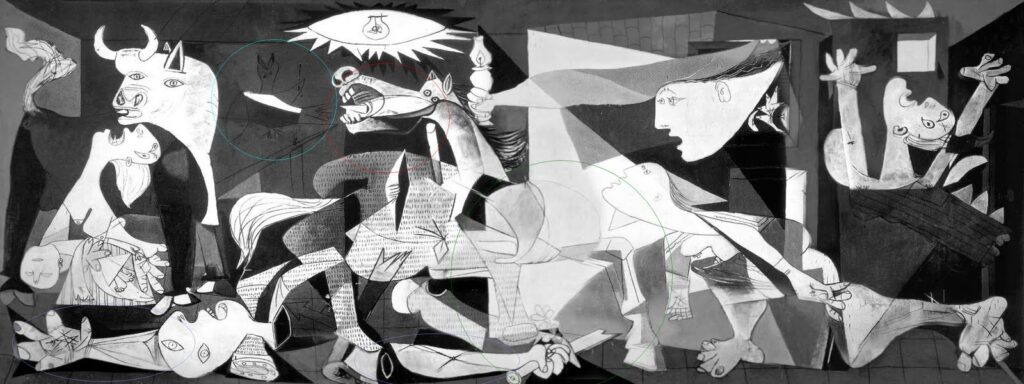
Currently there is a third attempt at forming an anarchist society in northeastern Syria, in the region called Rojava. When David Graeber, an anarchist himself, became aware of it he became terribly excited and a great supporter of this effort. And it is through him that I became aware of Rojava and the ideologue behind it — Abdullah Ocalan. I too am excited about this.
Abdullah Öcalan (1948- ) — The Idealogue of Rojava
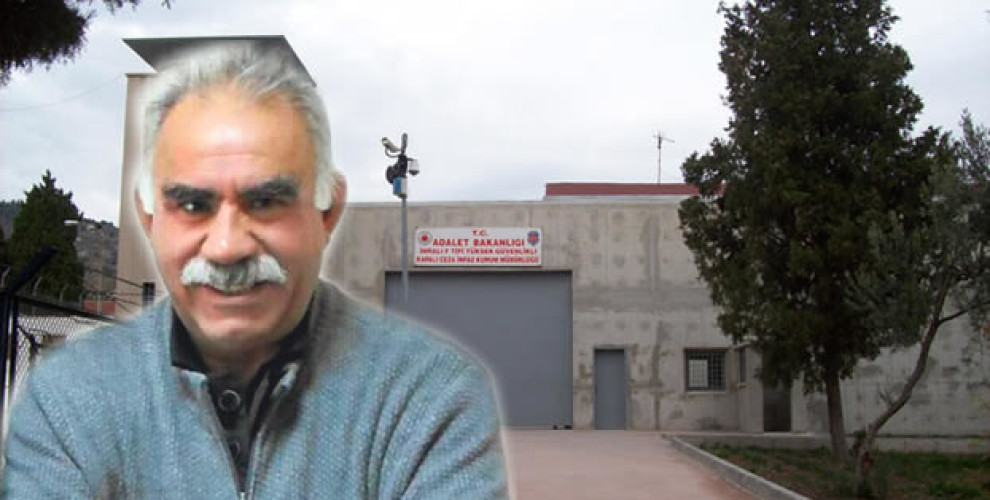
“Öcalan has written extensively on history, philosophy, and politics, and is regarded as a key figure for a political solution of the Kurdish issue. Since the author has been held totally incommunicado and not been able to consult his lawyers or receive regular visits for many years, this op-ed has been edited from his prison writings and recent statements by his collaborators and sent to Jacobin for publication. His recent works include The Sociology of Freedom (2020) and The Political Thought of Abdullah Öcalan (2017).”
His current thoughts are partially expresses in the following article:
Abdullah Öcalan: My Solution for Turkey, Syria, and the Kurds,” Jacobin, Aug. 7, 2020.
Publications by Abdullah Öcalan in English
Books
- Declaration on the Democratic Solution of the Kurdish Question (Neuss: Mesopotamia Publishers, 1999).
- War and Peace in Kurdistan, Cologne, 2009.
- Prison Writings I: The Roots of Civilization (London: Pluto Press, 2007).
- Prison Writings II: The PKK and the Kurdish Question in the 21st Century (London: Pluto Press, 2011).
- Prison Writings III: The Road Map to Negotiations (Neuss: Mesopotamia Publishers, 2012).
- The Road Map for Democratization of Turkey and Solution to the Kurdish Question (Summary), Cologne, 2011.
- Beyond State, Power, and Violence (Oakland: PM Press, 2020).
- Volume I: Civilization: The Age of Masked Gods and Disguised Kings (2nd revised edition, 2018).
- Volume II: Capitalism: The Age of Unmasked Gods and Naked Kings (2nd revised edition, 2020).
- Volume III: The Sociology of Freedom: Manifesto of the Democratic Civilization (2020).
- Volume IV: The Civilizational Crisis in the Middle East and the Democratic Civilization Solution (2022).
- Volume V: The Manifesto of the Kurdistan Revolution (2022).
Pamphlets Compiled from the Prison Writings
- War and Peace in Kurdistan (Cologne: International Initiative Edition, revised edition, 2017).
- Democratic Confederalism. (Cologne: International Initiative Edition, revised edition, 2017).
- Liberating Life: Woman’s Revolution (Cologne: International Initiative Edition, 2013).
- Democratic Nation (Cologne: International Initiative Edition, 2016).
On the writings of Abdullah Öcalan:
David Graeber on current attempts at anarchism in Syria: Rojava
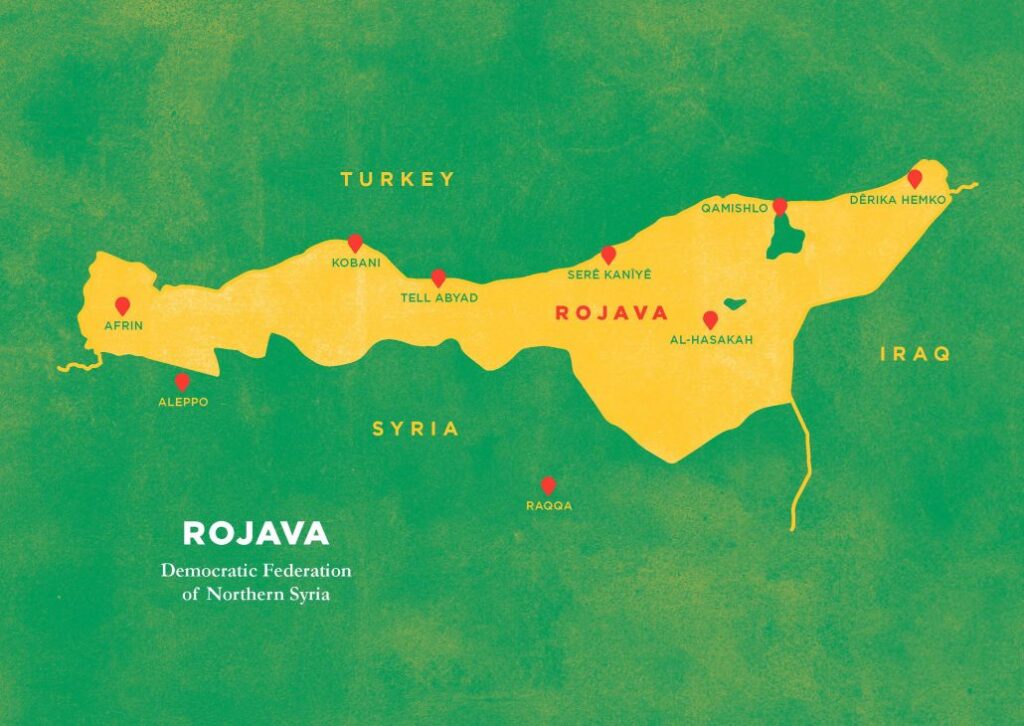
Revolution in Rojava with Debbie Bookchin and David Graeber (May 14, 2019)
Distribution of Kurds
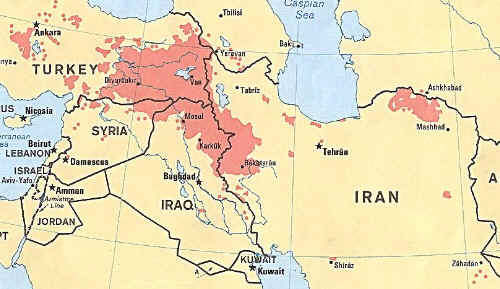
David Graeber (1961-2020)
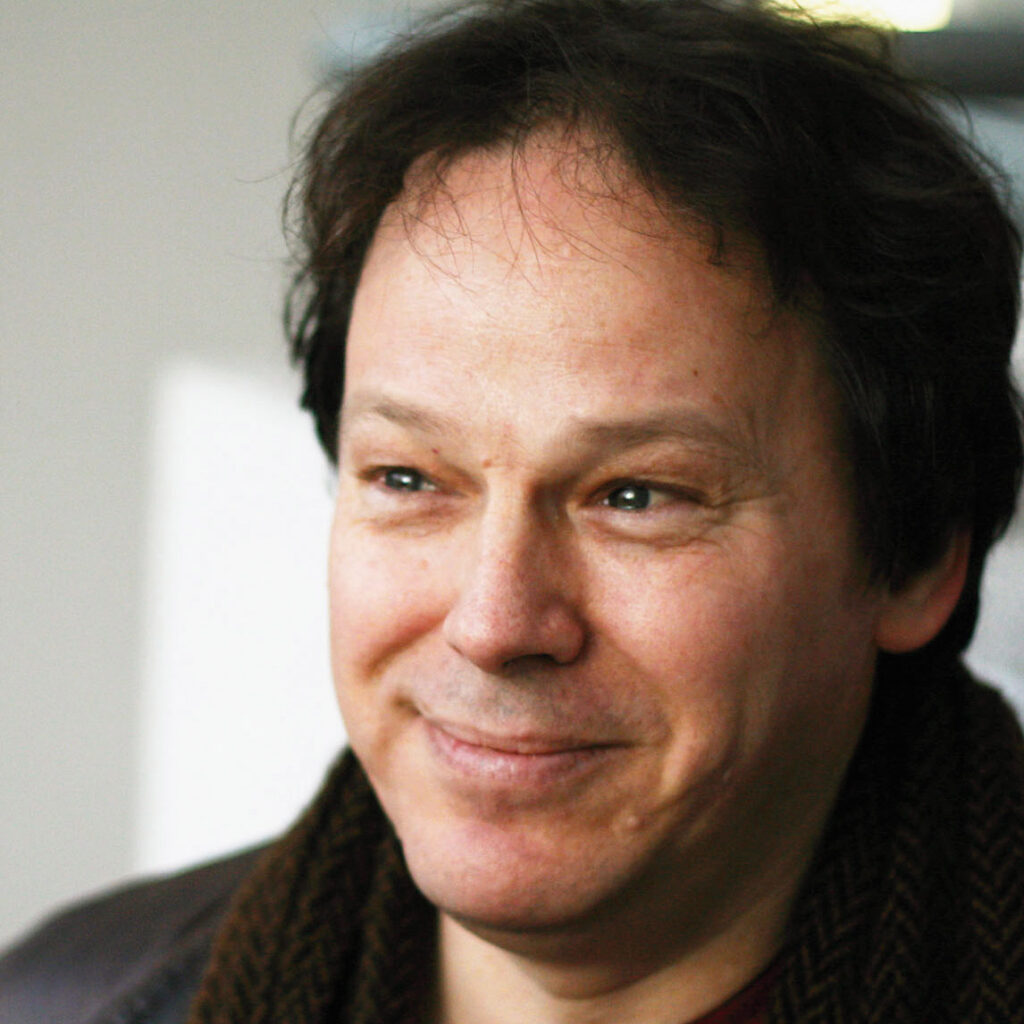
David Graeber, 1961–2020, The New York Review of Books, Sept. 5, 2020.
David Graeber, Toward An Anthropological Theory of Value , 2001.
David Graeber, Fragments of an Anarchist Anthropology, 2004.
David Graeber, Debt: The First 5,000 Years, 2011.
David Graeber, The Utopia of Rules: On Technology, Stupidity, and the Secret Joys of Bueaucracy , 2015.
David Graeber and Marshall Sahlins, On Kings, 2017.
David Graeber, Bullshit Jobs, 2018.
Bibliography of David Graeber’s Works, The Anarchist Library
